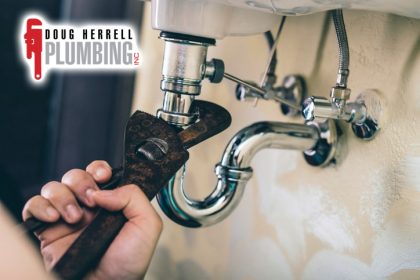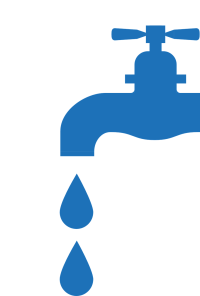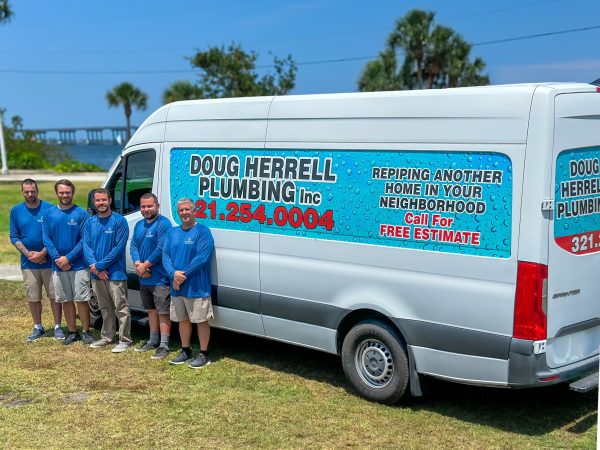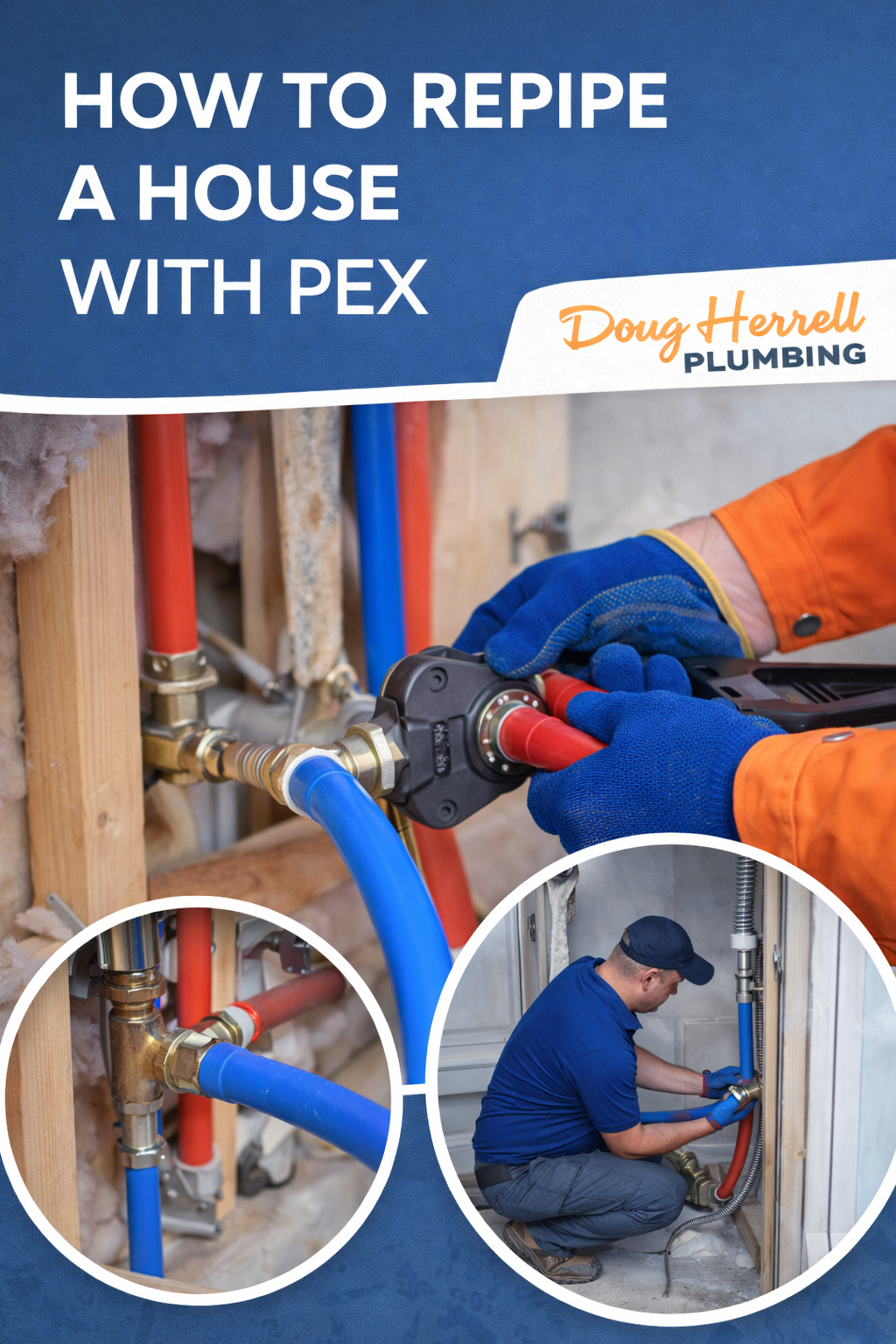
What is a Slab Leak?
A slab leak is a leak in the water pipes that run beneath the concrete foundation (or “slab”) of a home or building. These pipes are usually part of the plumbing system and can carry either hot or cold water. When they crack, break, or corrode, water leaks under the slab, which can lead to significant damage if not detected and repaired.
Common Causes of Slab Leaks:
- Corrosion of copper or galvanized pipes (especially in older homes)
- Abrasion from the pipe rubbing against concrete or gravel
- Improper installation or poor construction practices
- Shifting soil or foundation movement (common in areas with expansive clay soil)
- High water pressure or chemical reactions in the water
Slab leaks can be expensive to repair because accessing the pipes usually involves breaking through the foundation. Specialized leak detection equipment is often used to locate the leak precisely before repairs begin.

How to Know If You Have a Slab Leak
A slab leak can be tricky to detect because it occurs beneath your home’s concrete foundation, but there are several signs that may indicate a problem. One of the first clues is an unexplained increase in your water bill, suggesting water is escaping somewhere it shouldn’t be. You might also hear the sound of running water when no taps or appliances are in use. Warm or wet spots on your floor, particularly over concrete, can signal a hot water line leak beneath the slab. In some cases, you may notice musty odors or signs of mold and mildew, which can result from moisture seeping up through the flooring.
Other warning signs include cracks in floors or walls, which can develop as leaking water shifts the soil under your foundation, and a noticeable drop in water pressure. A simple DIY test involves turning off all water in the home and watching the water meter—if it continues to move, there may be a hidden leak. If you suspect a slab leak, it’s wise to contact a professional plumber who can use specialized tools like thermal imaging and acoustic sensors to locate the leak without unnecessary damage to your property.
Signs That You Might Have a Slab Leak:
- Unexplained increase in water bills
- Warm or damp spots on floors
- Mold or mildew smells
- Cracks in floors or walls
- Running water sounds when no fixtures are in use
Slab Leak Detection
Slab leak detection is the process of finding water leaks that happen underneath a concrete foundation, also known as a slab. These leaks can be caused by things like old or damaged pipes, shifting soil, or poor construction. If not caught early, slab leaks can lead to serious problems like cracks in your floor, mold, or damage to your home’s foundation.
There are a few signs that could mean you have a slab leak. You might notice higher water bills, warm spots on your floor, the sound of water running when no faucets are on, or even cracks in your flooring or walls. Sometimes, you may also see moisture or mildew under your carpet.
To find a slab leak, professionals use special tools and methods. They might use sensitive microphones to listen for water escaping from pipes, or thermal cameras to find warm spots caused by hot water leaks. Pressure testing can help find drops in water pressure, and video cameras can be used to look inside the pipes directly.
Finding and fixing a slab leak early can save you a lot of money and help prevent damage to your home. If you notice any signs, it’s a good idea to call a plumbing professional right away.
How to Fix a Slab Leak
Slab Leak Spot Repair (Direct Access)
Spot repair involves breaking open the concrete slab directly above the leak and repairing the damaged section of pipe. This method is often used when the leak is easily accessible and isolated. It’s a straightforward fix but requires cutting through flooring and concrete, which can be messy, noisy, and disruptive. Spot repair is generally best for newer homes or systems with a single, localized leak where the rest of the piping is in good condition.
Pipe Rerouting (Bypass the Leak)
Pipe rerouting bypasses the leaking section of pipe by installing new piping through the walls, attic, or ceiling. Instead of digging into the slab, plumbers redirect the water supply using alternative paths. This avoids damage to the foundation and is particularly useful when the leak is hard to access or part of a larger plumbing issue. While it requires opening up parts of the home’s interior, it’s less invasive overall than cutting into the slab and is ideal for older systems with multiple potential weak points.
Pipe Relining (Trenchless Repair)
Pipe relining is a trenchless repair method where a new lining—often an epoxy coating—is inserted into the existing pipe to seal any leaks. This technique reinforces the existing plumbing without the need to break through the concrete slab. It’s minimally invasive and can extend the life of the pipe significantly. However, it’s not suitable for all pipe types or severely damaged plumbing and may carry a higher upfront cost. It’s a good option for homeowners who want a durable fix with minimal disruption.
Full Home Repipe
A full repipe involves replacing the entire plumbing system, often by installing new pipes through the walls or ceiling to avoid the slab entirely. This is the most comprehensive and long-term solution, eliminating the risk of future slab leaks. While it’s a major project—often requiring significant construction work and investment—it’s the best approach for homes with aging or deteriorating plumbing throughout. It provides peace of mind and improved system reliability for years to come.
Important Notes About Slab Leaks
Detecting a slab leak accurately is crucial, and professional plumbers typically use specialized equipment such as acoustic listening devices, thermal imaging cameras, or pressure testing tools. In some cases, homeowners insurance may help cover the cost of repairs—especially if the leak has caused visible damage to the home. It’s always worth reviewing your policy and consulting with your provider if you suspect a slab leak.

Are Slab Leaks Covered By Insurance?
Slab Leaks That Are Usually Covered by Insurance
Most standard homeowners insurance policies will cover damage caused by a slab leak, especially if the leak is sudden and accidental. This typically includes repairs to flooring, drywall, baseboards, and even mold remediation, as long as the damage is discovered and reported promptly. Insurance will also generally cover the cost of accessing the broken pipe, such as tearing up the slab to reach it, although it may not cover the actual pipe repair itself. If the leak causes structural damage to the home, such as foundation shifting or wall cracking, that damage is often included in the coverage.
Leaks Usually Not Covered by Insurance
While insurance may help with the aftermath of a slab leak, it usually does not cover the repair or replacement of the damaged pipe itself. Most policies exclude issues caused by long-term wear and tear, corrosion, or poor maintenance. If it’s determined that the leak resulted from neglect—such as ignoring signs of moisture for an extended period—the insurer may deny the claim altogether. In these cases, the homeowner is typically responsible for the plumbing repair costs, which can be substantial depending on the scope of the damage.
What You Can Do
To understand your specific coverage, it’s important to review your policy carefully or speak directly with your insurance agent. Some companies offer optional endorsements or add-ons, like service line coverage or water backup protection, which may help with costs that standard policies exclude. If you ever suspect a slab leak, document the damage with photos, notify your insurer immediately, and take steps to mitigate further harm. Acting quickly and being informed about your policy can make a significant difference in how much financial responsibility you bear.
Typical Slab Leak Repair Costs
The cost to repair a slab leak can vary significantly depending on the location and severity of the leak, as well as the chosen repair method. Leak detection alone typically costs between $150 and $500, as it involves specialized equipment to locate the leak precisely without unnecessary damage. If the leak is small and easily accessible, a spot repair—cutting through the slab to fix the pipe—can range from $500 to $2,500. In cases where it’s more efficient to bypass the leaking section, pipe rerouting may be necessary. This involves running new pipes through walls or ceilings and generally costs between $1,500 and $5,000 or more.
For a less invasive option, some homeowners opt for pipe relining, a trenchless repair method where an epoxy coating is inserted into the existing pipe. This typically costs between $2,000 and $6,000 but is not always suitable depending on pipe condition and location. In homes with aging or extensively damaged plumbing systems, a full repipe might be recommended, which can cost anywhere from $4,000 to over $15,000 depending on the home’s size and plumbing complexity. Additionally, if water damage has occurred—such as soaked flooring, ruined drywall, or mold growth—repairs can add another $1,000 to $10,000 or more to the total bill.
Factors That Affect Slab Leak Cost
There are a few things that affect the total cost of slab leak repair. The location and accessibility of the leak play a big role—leaks under kitchens or bathrooms may be harder to reach and more expensive to fix. The type of plumbing material in your home also matters; for example, repairing or replacing copper or galvanized pipes tends to cost more than working with modern PEX piping. The layout and foundation type of your home can affect labor time and difficulty. If the leak has caused extensive water damage or mold growth, those remediation efforts will drive up the final cost. Labor rates vary by region, so where you live can significantly influence how much you’ll pay.

What’s Next?
Doug Herrell Plumbing is a trusted leader in Brevard County, Florida, specializing in slab leak detection and re-piping services. Call us today for a free estimate before a slab leak causes unnecessary damage to your property.
About Doug Herrell Plumbing – lic#CFC 048487
Doug Herrell Plumbing has been Brevard County’s source for plumbing services since 1980. We are a family owned and operated business and take tremendous pride in providing honest and reliable plumbing services at an affordable price.
CALL 321-254-0004
Serving Melbourne, Palm Bay, Viera, Suntree, Titusville, Merritt Island, Melbourne Beach, Indialantic, Indian Harbour Beach, Cape Canaveral, Satellite Beach, Rockledge, West Melbourne, Cocoa, and Cocoa Beach.
continue reading


